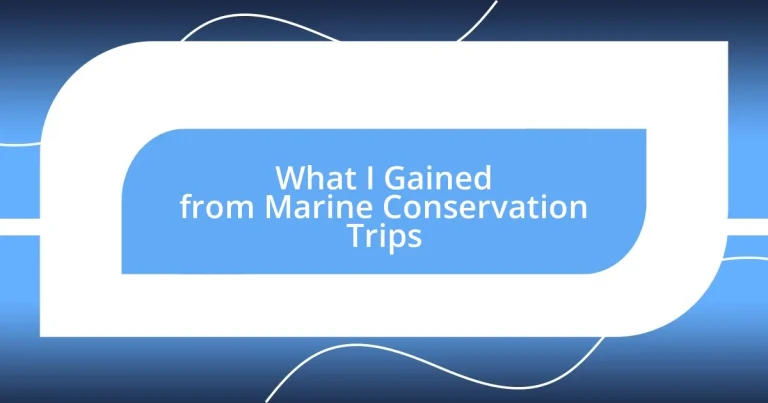Key takeaways:
- Personal growth comes from hands-on experiences in marine conservation, fostering resilience and a deeper emotional connection to the ocean.
- Volunteering in conservation projects positively impacts local communities by creating job opportunities and encouraging cultural exchange.
- Challenges faced in conservation work highlight the need for adaptability, understanding differing priorities, and the emotional toll of environmental degradation.
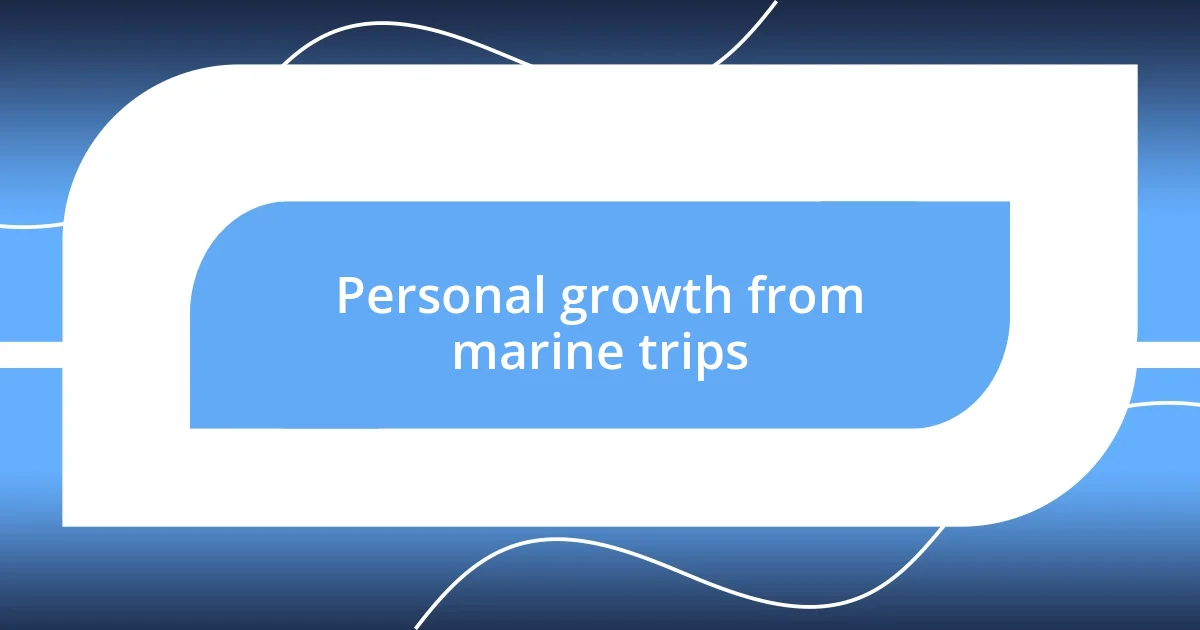
Personal growth from marine trips
Every marine conservation trip I’ve taken has left me with a deeper understanding of resilience. Once, while helping to rehabilitate a damaged reef, I felt overwhelmed by the scale of the task ahead. I realized that making even small contributions can lead to substantial change over time. Isn’t it fascinating how individual efforts can collectively create a significant impact on the environment?
On another trip, I met fellow volunteers from diverse backgrounds. Sharing our stories and experiences opened my eyes to different perspectives on conservation. I learned that collaboration is essential, and it sparked a newfound appreciation for teamwork. Isn’t it powerful to think about how our unique insights can enhance our collective mission?
Reflecting on these adventures, I’ve grown more connected to the ocean and its fragility. I often find myself questioning what more I can do to protect marine life. This emotional connection drives me to advocate for sustainable practices in my daily life. It makes me wonder—how can we inspire others to join us on this journey of stewardship?
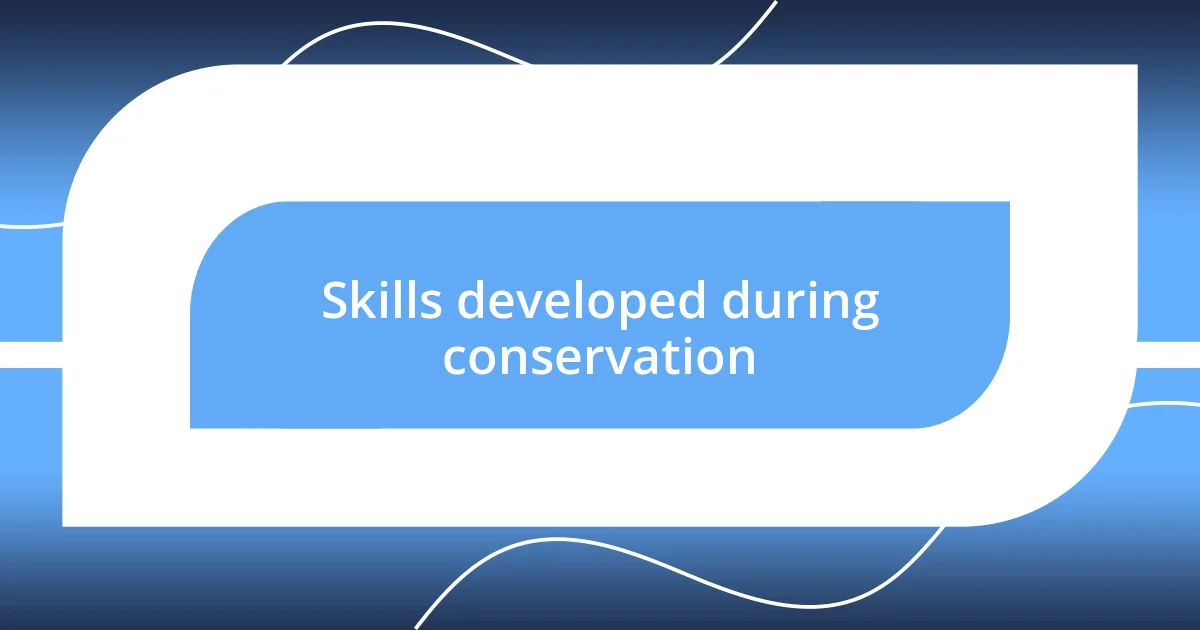
Skills developed during conservation
Engaging in marine conservation has equipped me with an array of skills that extend beyond environmental awareness. For instance, I took part in a beach cleanup where I had to coordinate with my teammates to create efficient strategies for collecting trash. This experience sharpened my organizational skills and taught me how to communicate effectively when working toward a common goal. I felt a sense of satisfaction as we transformed the beach, which reinforced my belief in the power of collaborative effort.
Here are some specific skills I’ve developed through these experiences:
- Leadership: Taking initiative during group projects to inspire and guide others.
- Problem-Solving: Navigating unexpected challenges, like adjusting plans due to weather conditions.
- Scientific Literacy: Gaining a deeper understanding of marine ecosystems and conservation techniques.
- Cultural Sensitivity: Learning to appreciate and respect diverse traditions and approaches to conservation from fellow volunteers worldwide.
- Public Speaking: Engaging with community members about the importance of marine conservation, enhancing my ability to communicate passionately about environmental issues.
Each trip has been a lesson, not just in ecology, but in becoming a more rounded individual dedicated to fostering change. I recall one day when I had to present our findings on a coral survey to a group; the nerves were real! Yet, by the end, I felt empowered, knowing that I was advocating for the ocean in a way that could inspire action in others. This journey is about acquiring skills that help me contribute more effectively to our planet’s well-being.
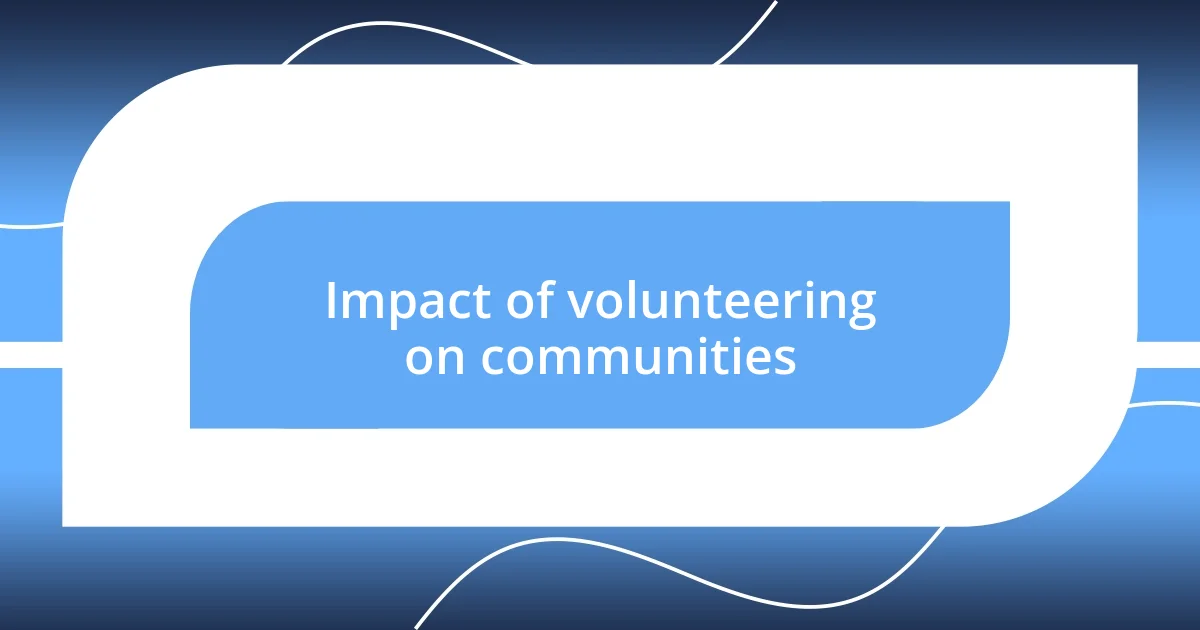
Impact of volunteering on communities
Volunteering in marine conservation projects has a profound impact on local communities. During one trip, I witnessed how a coral restoration initiative not only revived the marine ecosystem but also provided job opportunities for local fishermen. Their newfound skills in sustainable practices allowed them to engage with tourists, offering snorkeling tours that showcased the healthy reefs instead of merely relying on fishing. It’s truly inspiring to see how environmental efforts can translate into economic growth for these communities.
Moreover, the bonds forged between volunteers and locals foster cultural exchange and collaboration. I remember sharing meals with community members who taught us traditional fishing techniques that respect marine life. This interaction helped to build trust and understanding among diverse groups, leading to joint efforts in conservation. Isn’t it beautiful how simple acts of sharing can motivate us to work together for a common cause?
The ripple effects of volunteering can lead to lasting change in communities. One volunteer project I joined established a marine education program in schools, which inspired students to become stewards of their coastal environment. Walking into classrooms filled with eager young faces passionate about protecting the ocean was incredibly rewarding. It made me reflect on how our collective efforts as volunteers not only impact the present but also shape the future.
| Impact Area | Description |
|---|---|
| Economic Growth | Initiatives provide new job opportunities in eco-tourism, improving local livelihoods. |
| Cultural Exchange | Volunteers and locals share knowledge and traditions, fostering collaboration. |
| Education | Marine conservation programs teach young people about the ocean and encourage stewardship. |
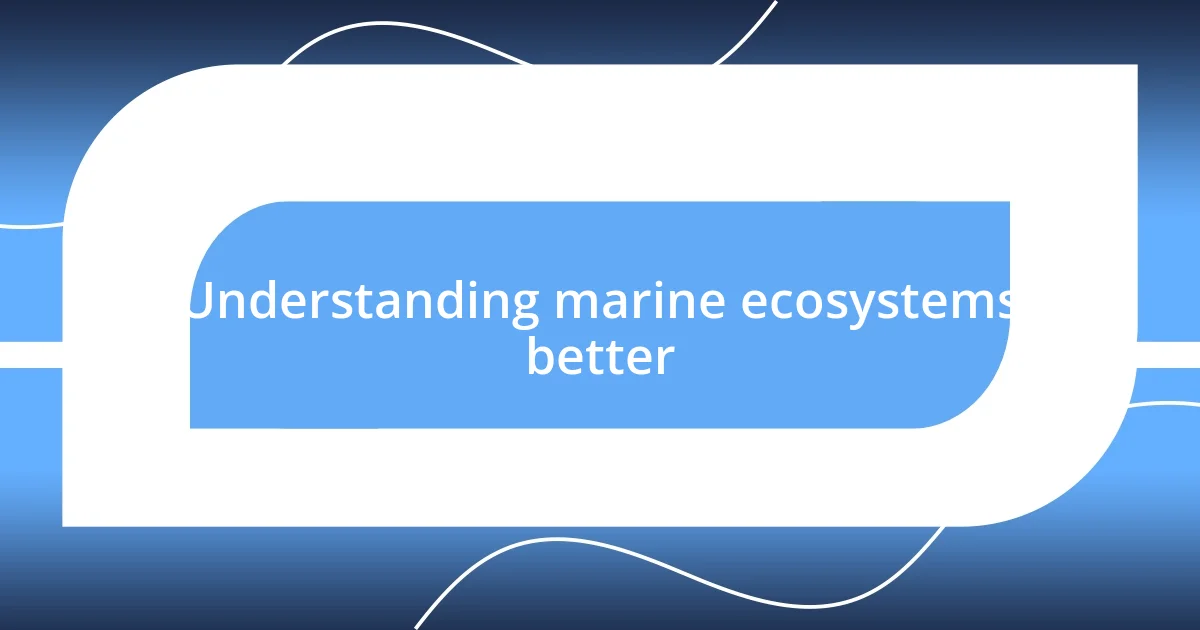
Understanding marine ecosystems better
Understanding marine ecosystems better can profoundly shift our perspective on the world beneath the waves. During one of my trips, I had the chance to observe a thriving kelp forest up close—it’s like walking through a vibrant underwater forest bursting with life. The sheer variety of species coexisting, from playful sea otters to schools of shimmering fish, made me realize just how interconnected these ecosystems truly are. Can you imagine the intricate relationships and dependencies that exist here? It left me in awe of nature’s design.
As I delved deeper into marine biology during our field studies, I uncovered fascinating interactions that often go unnoticed. For example, did you know that cleaner fish play a vital role by removing parasites from larger fish? Watching this symbiotic relationship unfold in real time was like witnessing a tiny ecosystem work in harmony. It reinforced my understanding of balance and interdependence in marine environments. Have you ever considered how every action—big or small—can impact the ecosystem as a whole? I certainly have.
I also remember a particularly thought-provoking evening lecture led by a local marine biologist. He spoke passionately about the effects of climate change on coral reefs and the urgency behind conservation efforts. Sitting there, surrounded by fellow volunteers, I felt a collective sense of responsibility swell within us. It prompted me to think about my own contributions to protecting marine life. What can we do today to ensure that future generations inherit a healthy ocean? This question still lingers in my mind, guiding my actions beyond the trip itself.
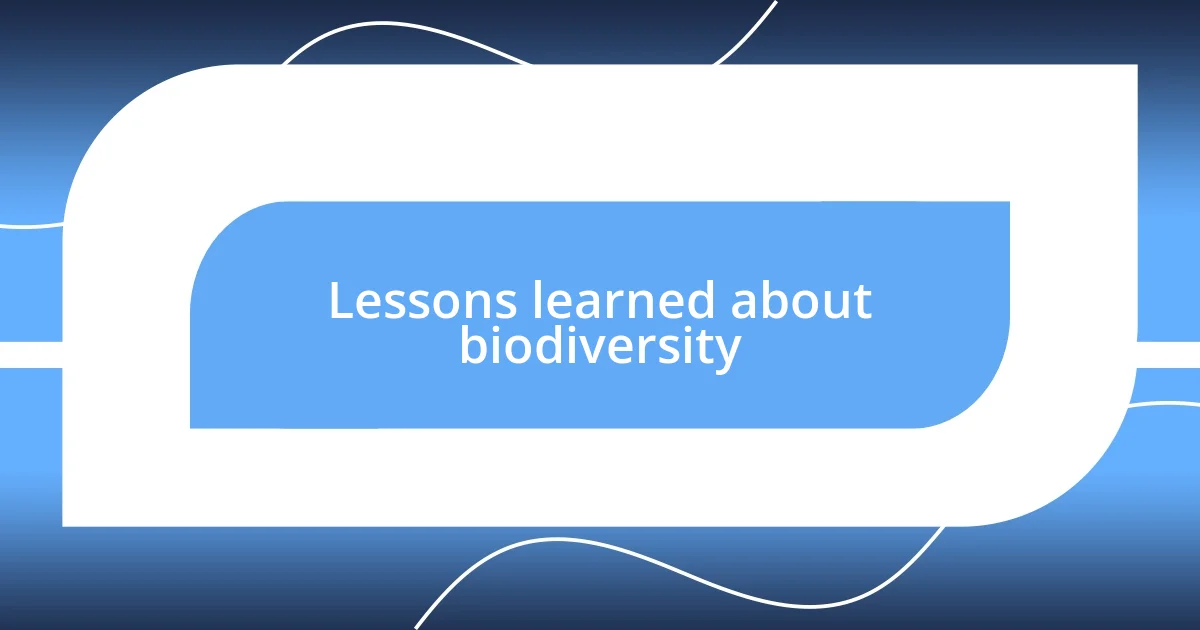
Lessons learned about biodiversity
One of the most profound lessons I took away about biodiversity is how every creature, no matter how small, plays a role in the marine ecosystem. During one dive, I was fascinated watching a tiny shrimp cleaning a moray eel. This relationship isn’t just adorable; it highlights the crucial interdependence within marine life. Isn’t it incredible to think that such small interactions can have large implications for the health of the entire reef?
What struck me even more was witnessing the impact of biodiversity loss firsthand. On a recent excursion to a once-flourishing reef, I found it sadly diminished. The vibrant corals had faded into ghostly skeletons, and the vibrant fish were nowhere to be seen. It was a stark reminder of how sensitive these ecosystems are to change. I left that site with a heavy heart and a determination to advocate for better conservation practices. Have you ever felt that sense of urgency when confronted with the consequences of inaction?
Additionally, participating in species monitoring efforts introduced me to the idea of keystone species. These species, like sea turtles and certain types of fish, maintain the structure of their ecological community. Tracking their populations felt like piecing together a puzzle that directly connects to the health of the entire marine environment. Each time I marked a turtle on our survey, I couldn’t help but think about how vital their presence is for ensuring a balanced ecosystem. Isn’t it fascinating to realize how these seemingly ordinary animals hold the key to preserving rich biodiversity?
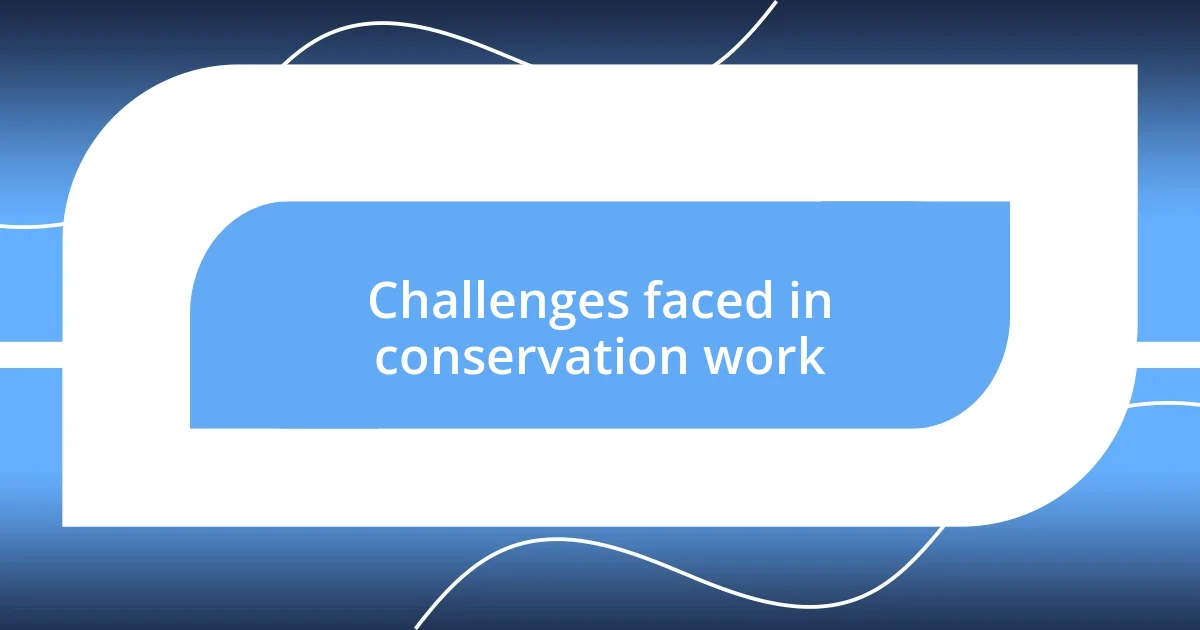
Challenges faced in conservation work
One challenge I encountered during my marine conservation trips was grappling with the local communities’ differing priorities. While our mission was to protect marine habitats, not everyone saw the immediate value in conservation. I remember speaking with a fisherman who depended on the ocean for his livelihood. His concerns about reduced catch sizes due to conservation regulations left me reflecting on the delicate balance between ecological preservation and economic survival. How can we foster a partnership that values both the ocean’s health and the community’s needs?
Another hurdle was dealing with the unpredictable nature of marine environments. I recall a day when our dive plans were thwarted by unexpected weather changes. We had to pivot quickly, finding alternative methods to contribute to our conservation goals. This taught me that adaptability is crucial in this line of work. Have you ever had to shift your plans dramatically? I found that embracing uncertainty often leads to unexpected opportunities for creativity and collaboration.
Finally, one of the most profound challenges was confronting the emotional toll of witnessing environmental degradation. As we collected data on pollution levels in our dive sites, I felt overwhelming sadness seeing plastic waste entangling wildlife. It was disheartening, yet it ignited a fire within me to advocate for change. Have you ever felt that gut-wrenching mix of despair and motivation? It made me realize that every piece of trash we pick up is not just a small act—it’s a step towards inspiring wider change.
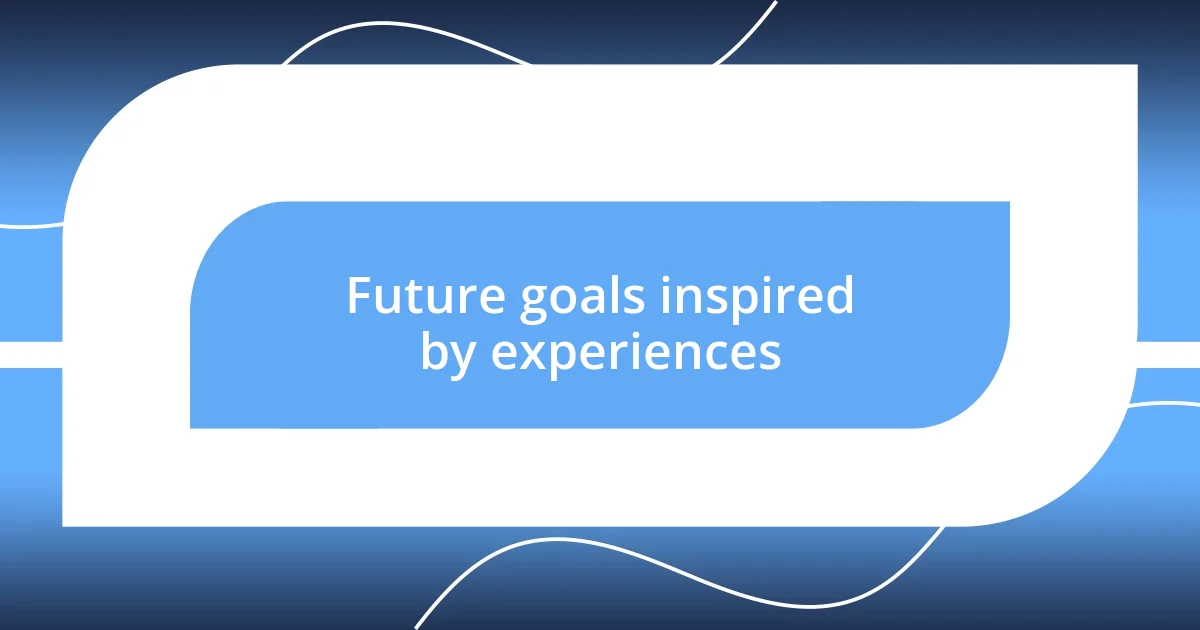
Future goals inspired by experiences
Inspired by my experiences in marine conservation, I find myself drawn to goal-setting that not only promotes awareness but also engages others in meaningful action. For instance, after participating in a community beach cleanup, I felt empowered to lead a local initiative that invites my friends and neighbors to join the effort. Have you ever thought about how a small action could ripple into a larger movement? This simple idea sparked spirited conversations and a renewed commitment to protecting our coastlines, proving that community involvement can amplify impact.
Additionally, my time underwater opened my eyes to the urgent need for ocean education. I’ve decided to develop workshops aimed at schools in my area to share what I’ve learned about marine biodiversity and conservation. What if we could equip the next generation with the knowledge to cherish and protect our oceans? I believe that fostering this connection early on can nurture lifelong advocates for marine health, making this endeavor not just a personal goal but a collective mission.
Ultimately, witnessing the fragile beauty of coral reefs has ignited a desire within me to pursue a career in marine biology. I often reflect on how deeply these vibrant ecosystems have changed my perspective on life. Isn’t it amazing how nature can evoke such passion? I hope to blend my experiences with scientific research, advocating for policies that protect our oceans while inspiring others to respect and cherish these precious environments.












